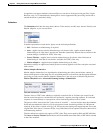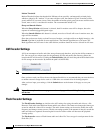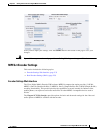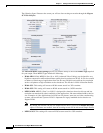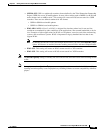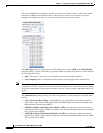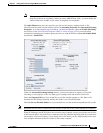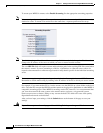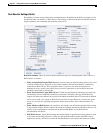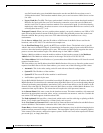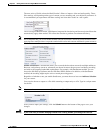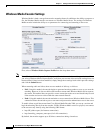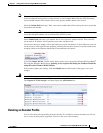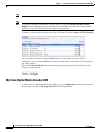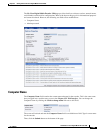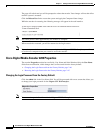
2-39
User Guide for Cisco Digital Media Encoder 2200
OL-17938-01
Chapter 2 Getting to Know the Cisco Digital Media Encoder 2200
Encoder Preset (A, B, and C)
Real Encoder Settings (Helix)
Real (Helix) is both a storage format and a streaming format. In addition to the ability to output to a file,
the Real Encoder can stream to a Helix Server. The settings for the Real Encoder include the ability to
adjust parameters for connecting and streaming to the server.
Broadcast Method: There are several different broadcast types for streaming Real format video to a
Helix Server, as follows:
• Push, Account-Based Login (Helix Server): Account-based, push broadcasting allows you to send
a stream to Helix Server version 9 or later. In this method, the encoder maintains a monitoring
connection to Helix Server. This connection allows it to pass a user name and password to
authenticate access to the server. Helix Server uses this connection to send statistics about the
broadcast stream back to the encoder.
• Push, Password-Only Login (Helix Server): Unlike account-based broadcasting, password-only
broadcasting does not establish a monitoring connection. Therefore, this type of broadcasting
requires less network overhead, but receives no feedback from Helix Server. This broadcast method
allows you to send a live stream to Helix Server version 9 or later. However, you must set up the
server as a receiver in a splitting arrangement. Please refer to Helix Server documentation for
details.
• Push, Multicast (Helix Server): In a multicast, the encoder can deliver the same broadcast stream
to any number of Helix Servers without increasing its outgoing bandwidth. The Helix Servers will
need to be pre-configured for a multicast from the encoder. Refer to your Helix Server
documentation for details.
• Pull (Helix Server): In pull broadcasting, the encoder begins to generate broadcast packets as soon
as you start the encoding. However, it does not deliver the broadcast stream until Helix Server
requests the stream, which occurs when the first RealPlayer
®
user requests the broadcast. In that



